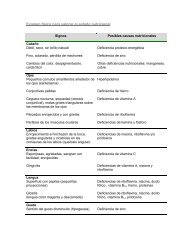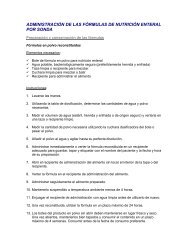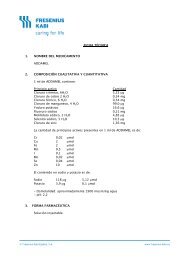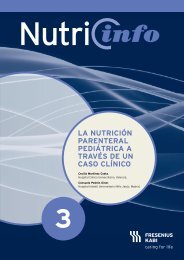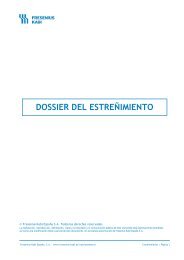El anciano al final de la vida: conflictos éticos - Fresenius Kabi España
El anciano al final de la vida: conflictos éticos - Fresenius Kabi España
El anciano al final de la vida: conflictos éticos - Fresenius Kabi España
You also want an ePaper? Increase the reach of your titles
YUMPU automatically turns print PDFs into web optimized ePapers that Google loves.
“<strong>El</strong> <strong>anciano</strong> <strong>al</strong> fin<strong>al</strong> <strong>de</strong> <strong>la</strong> <strong>vida</strong>:<br />
<strong>conflictos</strong> <strong>éticos</strong> ”<br />
( Omnipotentes <strong>de</strong>sv<strong>al</strong>idos )<br />
Santiago Ruiz Grima<br />
Especi<strong>al</strong>ista en medicina familiar<br />
Máster en Bioética (UCM)<br />
Resi<strong>de</strong>ncia para mayores<br />
Colmenar Viejo (Madrid)<br />
santiago.ruiz@madrid.org<br />
1
… problemas <strong>éticos</strong> ?<br />
2
<strong>El</strong> <strong>anciano</strong> <strong>al</strong> fin<strong>al</strong> <strong>de</strong> <strong>la</strong> <strong>vida</strong>: <strong>conflictos</strong> <strong>éticos</strong><br />
“<strong>El</strong> <strong>anciano</strong> <strong>al</strong> fin<strong>al</strong> <strong>de</strong> <strong>la</strong> <strong>vida</strong>:<br />
<strong>conflictos</strong> <strong>éticos</strong> ”<br />
Omnipotentes:<br />
La rápida evolución <strong>de</strong> <strong>la</strong><br />
Medicina y el progresivo<br />
<strong>de</strong>sarrollo imperativo<br />
tecnológico, han creado <strong>la</strong><br />
convicción <strong>de</strong> que todo es<br />
posible para <strong>la</strong> ciencia.<br />
3
<strong>El</strong> <strong>anciano</strong> <strong>al</strong> fin<strong>al</strong> <strong>de</strong> <strong>la</strong> <strong>vida</strong>: <strong>conflictos</strong> <strong>éticos</strong><br />
“<strong>El</strong> <strong>anciano</strong> <strong>al</strong> fin<strong>al</strong> <strong>de</strong> <strong>la</strong> <strong>vida</strong>:<br />
<strong>conflictos</strong> <strong>éticos</strong> ”<br />
Desv<strong>al</strong>idos:<br />
Nos sentimos perdidos a <strong>la</strong><br />
hora <strong>de</strong> tomar <strong>de</strong>cisiones y<br />
esperamos que “otros” <strong>la</strong>s<br />
tomen por nosotros.<br />
4
<strong>El</strong> <strong>anciano</strong> <strong>al</strong> fin<strong>al</strong> <strong>de</strong> <strong>la</strong> <strong>vida</strong>: <strong>conflictos</strong> <strong>éticos</strong><br />
“<strong>El</strong> <strong>anciano</strong> <strong>al</strong> fin<strong>al</strong> <strong>de</strong> <strong>la</strong> <strong>vida</strong>:<br />
<strong>conflictos</strong> <strong>éticos</strong> ”<br />
Análisis Ético:<br />
“ No todo lo técnicamente<br />
posible es éticamente<br />
correcto ”<br />
5
<strong>El</strong> <strong>anciano</strong> <strong>al</strong> fin<strong>al</strong> <strong>de</strong> <strong>la</strong> <strong>vida</strong>: <strong>conflictos</strong> <strong>éticos</strong><br />
Termin<strong>al</strong>idad vs fin<strong>al</strong> <strong>de</strong> <strong>la</strong> <strong>vida</strong><br />
Concepto abstracto<br />
Re<strong>la</strong>ción con <strong>la</strong> edad<br />
Coste sociofamiliar<br />
Coste económico<br />
Ciencia y caridad . Picasso (1897)<br />
Museo Picasso Barcelona<br />
6
… <strong>El</strong> fin<strong>al</strong> <strong>de</strong> <strong>la</strong> <strong>vida</strong><br />
Aumento <strong>de</strong> <strong>la</strong><br />
probabilidad <strong>de</strong> muerte<br />
Proyecto <strong>de</strong> <strong>vida</strong><br />
terminado<br />
Aparición <strong>de</strong> incapacidad<br />
<strong>El</strong> <strong>anciano</strong> <strong>al</strong> fin<strong>al</strong> <strong>de</strong> <strong>la</strong> <strong>vida</strong>: <strong>conflictos</strong> <strong>éticos</strong><br />
“Las tres eda<strong>de</strong>s y <strong>la</strong> muerte”. Hans B<strong>al</strong>dung (1543)<br />
Museo <strong>de</strong>l Prado<br />
7
<strong>El</strong> <strong>anciano</strong> <strong>al</strong> fin<strong>al</strong> <strong>de</strong> <strong>la</strong> <strong>vida</strong>: <strong>conflictos</strong> <strong>éticos</strong><br />
Fin<strong>al</strong> <strong>de</strong> <strong>la</strong> <strong>vida</strong> y trayectorias <strong>de</strong> enfermedad (I)<br />
Funcion<strong>al</strong>idad<br />
Alta<br />
Baja<br />
Tiempo<br />
MUERTE SUBITA<br />
Acci<strong>de</strong>ntes (aprox. 8 %)<br />
Muerte<br />
Depen<strong>de</strong>ncia<br />
Lunney JR.Lynn J. Hogan C .Profiles of ol<strong>de</strong>r medicare <strong>de</strong>cen<strong>de</strong>nts.<br />
J.Am Geriatr Soc 2002;50:1108-1112<br />
8
<strong>El</strong> <strong>anciano</strong> <strong>al</strong> fin<strong>al</strong> <strong>de</strong> <strong>la</strong> <strong>vida</strong>: <strong>conflictos</strong> <strong>éticos</strong><br />
Fin<strong>al</strong> <strong>de</strong> <strong>la</strong> <strong>vida</strong> y trayectorias <strong>de</strong> enfermedad (II)<br />
Funcion<strong>al</strong>idad<br />
Alta<br />
Baja<br />
PERIODO CORTO CLARO DECLIVE<br />
Cáncer (aprox. 20 %)<br />
Tiempo<br />
Depen<strong>de</strong>ncia / Termin<strong>al</strong>idad<br />
Muerte<br />
Lunney JR.Lynn J. Hogan C .Profiles of ol<strong>de</strong>r medicare <strong>de</strong>cen<strong>de</strong>nts.<br />
J.Am Geriatr Soc 2002;50:1108-1112<br />
9
<strong>El</strong> <strong>anciano</strong> <strong>al</strong> fin<strong>al</strong> <strong>de</strong> <strong>la</strong> <strong>vida</strong>: <strong>conflictos</strong> <strong>éticos</strong><br />
Fin<strong>al</strong> <strong>de</strong> <strong>la</strong> <strong>vida</strong> y trayectorias <strong>de</strong> enfermedad (III)<br />
Funcion<strong>al</strong>idad<br />
Alta<br />
Baja<br />
LIMITACIONES PROGRESIVAS A LARGO<br />
PLAZO CON EPISODIOS GRAVES<br />
INTERMITENTES<br />
Enfermeda<strong>de</strong>s crónicas progresivas<br />
(aprox. 25 %)<br />
Tiempo<br />
Depen<strong>de</strong>ncia<br />
Muerte<br />
Lunney JR.Lynn J. Hogan C .Profiles of ol<strong>de</strong>r medicare <strong>de</strong>cen<strong>de</strong>nts.<br />
J.Am Geriatr Soc 2002;50:1108-1112<br />
10
<strong>El</strong> <strong>anciano</strong> <strong>al</strong> fin<strong>al</strong> <strong>de</strong> <strong>la</strong> <strong>vida</strong>: <strong>conflictos</strong> <strong>éticos</strong><br />
Fin<strong>al</strong> <strong>de</strong> <strong>la</strong> <strong>vida</strong> y trayectorias <strong>de</strong> enfermedad (IV)<br />
Funcion<strong>al</strong>idad<br />
Alta<br />
Baja<br />
Anciano frágil y <strong>de</strong>mencia<br />
(aprox. 40%)<br />
Depen<strong>de</strong>ncia<br />
Tiempo<br />
DETERIORO PROGRESIVO<br />
PROLONGADO<br />
Muerte<br />
Lunney JR.Lynn J. Hogan C .Profiles of ol<strong>de</strong>r medicare <strong>de</strong>cen<strong>de</strong>nts.<br />
J.Am Geriatr Soc 2002;50:1108-1112<br />
11
Al fin<strong>al</strong> <strong>de</strong> <strong>la</strong> <strong>vida</strong>...<br />
<strong>El</strong> <strong>anciano</strong> <strong>al</strong> fin<strong>al</strong> <strong>de</strong> <strong>la</strong> <strong>vida</strong>: <strong>conflictos</strong> <strong>éticos</strong><br />
Enfermedad oncológica termin<strong>al</strong> (OMS)<br />
Enfermedad avanzada, progresiva e incurable<br />
Ausencia <strong>de</strong> respuesta razonable a los tratamientos<br />
específicos espec ficos<br />
Múltiples ltiples síntomas s ntomas multifactori<strong>al</strong>es y cambiantes<br />
Gran impacto emocion<strong>al</strong> en el paciente y <strong>la</strong> familia<br />
Pronóstico Pron stico <strong>de</strong> <strong>vida</strong> inferior a seis meses<br />
12
Al fin<strong>al</strong> <strong>de</strong> <strong>la</strong> <strong>vida</strong>...<br />
<strong>El</strong> <strong>anciano</strong> <strong>al</strong> fin<strong>al</strong> <strong>de</strong> <strong>la</strong> <strong>vida</strong>: <strong>conflictos</strong> <strong>éticos</strong><br />
Enfermeda<strong>de</strong>s avanzadas no oncológicas<br />
Enfermedad pulmonar avanzada: OCFA<br />
Insuficiencia cardiaca avanzada<br />
Enfermedad hepática hep tica avanzada:<br />
cirrosis hepática hep tica<br />
Insuficiencia ren<strong>al</strong> crónica cr nica avanzada<br />
Demencias muy evolucionadas y enfermedad cerebro-<br />
vascu<strong>la</strong>r crónica cr nica avanzada<br />
Navarro Sanz J R.Cuidados p<strong>al</strong>iativos no oncológicos. Enfermedad<br />
Termin<strong>al</strong> : Concepto y factores pronósticos Guías médicas. Secp<strong>al</strong>.<br />
www.secp<strong>al</strong>.com<br />
13
<strong>El</strong> <strong>anciano</strong> <strong>al</strong> fin<strong>al</strong> <strong>de</strong> <strong>la</strong> <strong>vida</strong>: <strong>conflictos</strong> <strong>éticos</strong><br />
DEMENCIAS MUY EVOLUCIONADAS Y ENFERMEDAD<br />
CEREBROVASCULAR CRONICA AVANZADA<br />
Edad > 70 años a os<br />
FAST (Function<strong>al</strong> Assessment Staging) > 7c<br />
Deterioro cognitivo grave (MMSE: Mini-Ment<strong>al</strong> Mini Ment<strong>al</strong> State<br />
Examination < 14)<br />
Depen<strong>de</strong>ncia absoluta<br />
Presencia <strong>de</strong> complicaciones (comorbilidad, infecciones <strong>de</strong><br />
repetición repetici -urinarias, urinarias, respiratorias-, respiratorias , sepsis, fiebre a pesar <strong>de</strong> <strong>la</strong><br />
antibioterapia,...)<br />
Disfagia<br />
Desnutrición<br />
Desnutrici<br />
Ulceras por presión presi n refractarias grado 3-4 3<br />
Stuart B, et <strong>al</strong>. Medic<strong>al</strong> Guidlines for <strong>de</strong>termining prognosis in selected non cáncer<br />
diseases Nation<strong>al</strong> hospice Organization .Second Edition.Arlington.1996<br />
14
<strong>El</strong> <strong>anciano</strong> <strong>al</strong> fin<strong>al</strong> <strong>de</strong> <strong>la</strong> <strong>vida</strong>: <strong>conflictos</strong> <strong>éticos</strong><br />
¿ Qué aspectos <strong>de</strong>ben tenerse en cuenta<br />
para consi<strong>de</strong>rarlo termin<strong>al</strong>?<br />
M<strong>al</strong> pronostico vit<strong>al</strong><br />
Incurabilidad <strong>de</strong> <strong>la</strong> enfermedad<br />
V<strong>al</strong>ores y preferencias <strong>de</strong>l paciente<br />
Aspectos <strong>de</strong> <strong>la</strong> intervención<br />
intervenci<br />
15
<strong>El</strong> <strong>anciano</strong> <strong>al</strong> fin<strong>al</strong> <strong>de</strong> <strong>la</strong> <strong>vida</strong>: <strong>conflictos</strong> <strong>éticos</strong><br />
“<strong>El</strong> <strong>anciano</strong> <strong>al</strong> fin<strong>al</strong> <strong>de</strong> <strong>la</strong> <strong>vida</strong>:<br />
<strong>conflictos</strong> <strong>éticos</strong> ”<br />
• Conflicto:<br />
(Del <strong>la</strong>t. conflictus). conflictus).<br />
Asunto o problema <strong>de</strong> difícil dif cil<br />
solución. soluci n.<br />
– Dilema:<br />
(Del <strong>la</strong>t. dilemma, dilemma, y este <strong>de</strong>l gr. δίλεμμ δίλ μμα, , <strong>de</strong> δίς, δίς,<br />
dos, y<br />
λεμμα μμα, , premisa).<br />
. Duda, disyuntiva. Argumento que consiste en proponer<br />
dos proposiciones contrarias para llegar a <strong>la</strong> misma<br />
conclusión conclusi n ( “tengo tengo un dilema no se si irme <strong>de</strong><br />
vacaciones este mes o el siguiente”) siguiente<br />
Diccionario <strong>de</strong> <strong>la</strong> Re<strong>al</strong> Aca<strong>de</strong>mia <strong>de</strong> <strong>la</strong> Lengua<br />
16
<strong>El</strong> <strong>anciano</strong> <strong>al</strong> fin<strong>al</strong> <strong>de</strong> <strong>la</strong> <strong>vida</strong>: <strong>conflictos</strong> <strong>éticos</strong><br />
“<strong>El</strong> <strong>anciano</strong> <strong>al</strong> fin<strong>al</strong> <strong>de</strong> <strong>la</strong> <strong>vida</strong>:<br />
Ética (ethos ethos)<br />
<strong>conflictos</strong> <strong>éticos</strong> ”<br />
Carácter, costumbres, representa los sistemas <strong>de</strong> principios y<br />
v<strong>al</strong>ores humanos. Tiene por objeto <strong>la</strong> v<strong>al</strong>oración mor<strong>al</strong> <strong>de</strong> los<br />
actos humanos<br />
Bio (<strong>vida</strong> <strong>vida</strong>)<br />
Conocimientos biológicos, médicos, <strong>de</strong> <strong>la</strong> s<strong>al</strong>ud<br />
Diccionario <strong>de</strong> <strong>la</strong> Re<strong>al</strong> Aca<strong>de</strong>mia <strong>de</strong> <strong>la</strong> Lengua<br />
17
Bioética … que es ?<br />
<strong>El</strong> <strong>anciano</strong> <strong>al</strong> fin<strong>al</strong> <strong>de</strong> <strong>la</strong> <strong>vida</strong>: <strong>conflictos</strong> <strong>éticos</strong><br />
18
<strong>El</strong> <strong>anciano</strong> <strong>al</strong> fin<strong>al</strong> <strong>de</strong> <strong>la</strong> <strong>vida</strong>: <strong>conflictos</strong> <strong>éticos</strong><br />
¿Por qué tantos <strong>conflictos</strong> <strong>éticos</strong>?<br />
Progreso medicina<br />
técnico t cnico <strong>de</strong> <strong>la</strong><br />
(revolución (revoluci n tecnológica)<br />
tecnol gica)<br />
Re<strong>la</strong>ción Re<strong>la</strong>ci n médico m dico-paciente paciente<br />
(reconocimiento <strong>de</strong> los <strong>de</strong>rechos <strong>de</strong><br />
los pacientes)<br />
Acceso a los servicios <strong>de</strong><br />
s<strong>al</strong>ud<br />
(escasez <strong>de</strong> recursos sanitarios)<br />
19
Mundo racion<strong>al</strong>:<br />
Hechos : datos<br />
clínicos, <strong>de</strong><br />
diagnóstico,<br />
pronóstico y<br />
tratamiento<br />
Conflictos <strong>éticos</strong><br />
<strong>El</strong> <strong>anciano</strong> <strong>al</strong> fin<strong>al</strong> <strong>de</strong> <strong>la</strong> <strong>vida</strong>: <strong>conflictos</strong> <strong>éticos</strong><br />
Mundo emocion<strong>al</strong>:<br />
mundo <strong>de</strong> los v<strong>al</strong>ores<br />
Sin v<strong>al</strong>ores <strong>la</strong> medicina podría ser técnicamente<br />
correcta, pero no sería HUMANA<br />
Pérez <strong>de</strong> Lucas N. Humanizar el fin<strong>al</strong> <strong>de</strong> <strong>la</strong> <strong>vida</strong>.<br />
Jornadas <strong>de</strong> cuidados p<strong>al</strong>iativos. Área 1.Madrid abril 2008<br />
20
<strong>El</strong> <strong>anciano</strong> <strong>al</strong> fin<strong>al</strong> <strong>de</strong> <strong>la</strong> <strong>vida</strong>: <strong>conflictos</strong> <strong>éticos</strong><br />
Conflictos <strong>éticos</strong> <strong>al</strong> fin<strong>al</strong> <strong>de</strong> <strong>la</strong> <strong>vida</strong><br />
Limitación Limitaci n <strong>de</strong>l esfuerzo terapéutico terap utico<br />
Técnicas cnicas <strong>de</strong> soporte vit<strong>al</strong><br />
Eutanasia<br />
Consentimiento informado<br />
M<strong>al</strong>os tratos<br />
Intimidad-confi<strong>de</strong>nci<strong>al</strong>idad Intimidad confi<strong>de</strong>nci<strong>al</strong>idad ...<br />
Alimentación Alimentaci n e hidratación hidrataci n <strong>al</strong> fin<strong>al</strong> <strong>de</strong> <strong>la</strong> <strong>vida</strong><br />
21
<strong>El</strong> <strong>anciano</strong> <strong>al</strong> fin<strong>al</strong> <strong>de</strong> <strong>la</strong> <strong>vida</strong>: <strong>conflictos</strong> <strong>éticos</strong><br />
Principio básico <strong>de</strong> <strong>la</strong> <strong>vida</strong> mor<strong>al</strong><br />
<strong>El</strong> respeto <strong>de</strong> los seres humanos como fines<br />
en si mismo, y el respeto <strong>de</strong> <strong>la</strong>s <strong>de</strong>más <strong>de</strong>m<br />
cosas humanos<br />
como medios para los seres<br />
Principios básicos b sicos en Bioética Bio tica<br />
Gracia D. Ética médica. En Farreras P, editor. Medicina Interna.<br />
Madrid: <strong>El</strong>servier,2004; 55-67<br />
22
<strong>El</strong> <strong>anciano</strong> <strong>al</strong> fin<strong>al</strong> <strong>de</strong> <strong>la</strong> <strong>vida</strong>: <strong>conflictos</strong> <strong>éticos</strong><br />
<strong>El</strong> princip<strong>al</strong>ísmo en BIOÉTICA<br />
AUTONOMÍA: : Derecho <strong>de</strong>l paciente a <strong>la</strong> toma <strong>de</strong> <strong>de</strong>cisiones y a<br />
elegir libremente (sujeto mor<strong>al</strong> autónomo) aut nomo)<br />
BENEFICENCIA: : Hacer el bien <strong>al</strong> paciente<br />
NO MALEFICENCIA: : No hacer daño da o <strong>al</strong> paciente (“primum primum non<br />
nocere”) nocere<br />
JUSTICIA: Todas <strong>la</strong>s personas merecen ser tratadas con <strong>la</strong><br />
misma consi<strong>de</strong>ración consi<strong>de</strong>raci n y respeto<br />
Beauchamp y Childress<br />
23
Niveles jerárquicos<br />
ETICA MÍNIMOS<br />
NO MALEFICENCIA<br />
JUSTICIA<br />
(ética publica)<br />
ÉTICA MÁXIMOS<br />
AUTONOMÍA<br />
BENEFICENCIA<br />
(ética privada)<br />
<strong>El</strong> <strong>anciano</strong> <strong>al</strong> fin<strong>al</strong> <strong>de</strong> <strong>la</strong> <strong>vida</strong>: <strong>conflictos</strong> <strong>éticos</strong><br />
PPIO BÁSICO DE<br />
LA VIDA MORAL<br />
24
caso clínico<br />
<strong>El</strong> <strong>anciano</strong> <strong>al</strong> fin<strong>al</strong> <strong>de</strong> <strong>la</strong> <strong>vida</strong>: <strong>conflictos</strong> <strong>éticos</strong><br />
Mujer <strong>de</strong> 87 años que pa<strong>de</strong>ce <strong>de</strong>terioro cognitivo severo , <strong>de</strong>mencia tipo<br />
vascu<strong>la</strong>r, <strong>de</strong> 5 años <strong>de</strong> evolución, está encamada y en posición fet<strong>al</strong>, es<br />
<strong>de</strong>pendiente para ABVD, tras una caída presentó fractura <strong>de</strong> ca<strong>de</strong>ra izquierda<br />
siendo intervenida quirúrgicamente, en dicho ingreso hospit<strong>al</strong>ario se colocó<br />
una sonda nasogástrica porque <strong>la</strong> paciente se negaba a <strong>la</strong> ingesta. En<br />
<strong>al</strong>guna ocasión se <strong>la</strong> ha arrancado . Cada vez que se le coloca una nueva,<br />
muestra inquietud y agitación. Durante un fin <strong>de</strong> semana y coincidiendo<br />
con <strong>la</strong> visita <strong>de</strong> familiares ( sobrinos) <strong>la</strong> paciente pier<strong>de</strong> <strong>la</strong> sonda<br />
nasogástrica, <strong>la</strong> enfermera <strong>al</strong> ir a colocar<strong>la</strong> ,se encuentra con <strong>la</strong> disparidad <strong>de</strong><br />
opinión entre los familiares , “ unos creen que no se le <strong>de</strong>bería poner <strong>de</strong><br />
nuevo, piensan que no sirve para nada, que se le está haciendo sufrir” , sin<br />
embargo los otros opinan : “ que si no se le pone, no se le <strong>al</strong>imenta y es<br />
como <strong>de</strong>jar<strong>la</strong> morir”<br />
Ante esta situación, <strong>la</strong> enfermera le comenta el caso <strong>al</strong> médico <strong>de</strong> <strong>la</strong><br />
resi<strong>de</strong>ncia para que tome una <strong>de</strong>cisión<br />
25
<strong>El</strong> <strong>anciano</strong> <strong>al</strong> fin<strong>al</strong> <strong>de</strong> <strong>la</strong> <strong>vida</strong>: <strong>conflictos</strong> <strong>éticos</strong><br />
Toma <strong>de</strong> <strong>de</strong>cisiones:<br />
26
<strong>El</strong> <strong>anciano</strong> <strong>al</strong> fin<strong>al</strong> <strong>de</strong> <strong>la</strong> <strong>vida</strong>: <strong>conflictos</strong> <strong>éticos</strong><br />
Conflicto ético: <strong>al</strong>imentación artifici<strong>al</strong><br />
Cuidado básico Tratamiento<br />
Obligatorio<br />
mor<strong>al</strong>mente<br />
Simplemente<br />
opcion<strong>al</strong><br />
27
<strong>El</strong> <strong>anciano</strong> <strong>al</strong> fin<strong>al</strong> <strong>de</strong> <strong>la</strong> <strong>vida</strong>: <strong>conflictos</strong> <strong>éticos</strong><br />
Conflicto ético: <strong>al</strong>imentación artifici<strong>al</strong><br />
Limitación esfuerzo terapéutico:<br />
La <strong>de</strong>cisión <strong>de</strong> restringir o cance<strong>la</strong>r <strong>al</strong>gún tipo <strong>de</strong><br />
medidas cuando se percibe una <strong>de</strong>sproporción<br />
entre los fines y los medios ,con el objetivo <strong>de</strong> no<br />
caer en <strong>la</strong> obstinación terapéutica<br />
“Cargas y Beneficios” “Futilidad”<br />
28
<strong>El</strong> <strong>anciano</strong> <strong>al</strong> fin<strong>al</strong> <strong>de</strong> <strong>la</strong> <strong>vida</strong>: <strong>conflictos</strong> <strong>éticos</strong><br />
Conflicto ético: <strong>al</strong>imentación artifici<strong>al</strong><br />
Obstinación terapéutica:<br />
La utilización <strong>de</strong> medios tecnológicos para<br />
prolongar ,artifici<strong>al</strong>mente <strong>la</strong> <strong>vida</strong> biológica <strong>de</strong> un<br />
paciente con una enfermedad irreversible o<br />
termin<strong>al</strong>.<br />
29
<strong>El</strong> <strong>anciano</strong> <strong>al</strong> fin<strong>al</strong> <strong>de</strong> <strong>la</strong> <strong>vida</strong>: <strong>conflictos</strong> <strong>éticos</strong><br />
Conflicto ético: <strong>al</strong>imentación artifici<strong>al</strong><br />
<strong>El</strong> mundo emocion<strong>al</strong> en los<br />
<strong>conflictos</strong> <strong>de</strong> “no inicio” o<br />
“retirada <strong>de</strong> tratamiento”<br />
Se suele:<br />
“poner” lo indicado<br />
“no poner “ lo no indicado o lo<br />
contraindicado<br />
“retirar” lo contraindicado<br />
Suele haber muchas<br />
resistencias para “retirar “ lo<br />
no indicado<br />
Barbero J.et <strong>al</strong> Limitación <strong>de</strong>l esfuerzo terapéutico.En: Gracia, D. Ética en <strong>la</strong> practica clínica.<br />
Madrid :Triacaste<strong>la</strong>,2004;161-181<br />
“<strong>El</strong> Grito”. E Munch (1893)<br />
G<strong>al</strong>ería Nacion<strong>al</strong> <strong>de</strong> Oslo<br />
30
<strong>El</strong> <strong>anciano</strong> <strong>al</strong> fin<strong>al</strong> <strong>de</strong> <strong>la</strong> <strong>vida</strong>: <strong>conflictos</strong> <strong>éticos</strong><br />
Conflicto ético: <strong>al</strong>imentación artifici<strong>al</strong><br />
¿Quién <strong>de</strong>be tomar <strong>la</strong> <strong>de</strong>cisión entre beneficios y<br />
perjuicios <strong>de</strong> <strong>la</strong> nutrición artifici<strong>al</strong>?<br />
adulto<br />
competente<br />
(Autonomía)<br />
adulto<br />
incompetente<br />
- Directiva anticipada<br />
- Juicio sustitutivo<br />
- Mejor interés<br />
31
<strong>El</strong> <strong>anciano</strong> <strong>al</strong> fin<strong>al</strong> <strong>de</strong> <strong>la</strong> <strong>vida</strong>: <strong>conflictos</strong> <strong>éticos</strong><br />
toma <strong>de</strong> <strong>de</strong>cisiones en ética clínica<br />
Familia<br />
Paciente Profesion<strong>al</strong>es<br />
32
<strong>El</strong> <strong>anciano</strong> <strong>al</strong> fin<strong>al</strong> <strong>de</strong> <strong>la</strong> <strong>vida</strong>: <strong>conflictos</strong> <strong>éticos</strong><br />
Procedimiento para <strong>la</strong> toma <strong>de</strong><br />
<strong>de</strong>cisiones en ética clínica<br />
¿ Cómo actuar sobre<br />
los problemas<br />
<strong>éticos</strong> que genera<br />
un caso clínico<br />
concreto?<br />
MÉTODO<br />
DELIBERATIVO<br />
33
<strong>El</strong> <strong>anciano</strong> <strong>al</strong> fin<strong>al</strong> <strong>de</strong> <strong>la</strong> <strong>vida</strong>: <strong>conflictos</strong> <strong>éticos</strong><br />
Procedimiento para <strong>la</strong> toma <strong>de</strong><br />
<strong>de</strong>cisiones en ética clínica<br />
Proceso <strong>de</strong> <strong>de</strong>liberación:<br />
… a<strong>de</strong>más <strong>de</strong> los principios, se tengan en<br />
cuenta <strong>la</strong>s circunstancias concretas <strong>de</strong>l<br />
caso y <strong>la</strong>s consecuencias previsibles a fin<br />
<strong>de</strong> tomar una <strong>de</strong>cisión pru<strong>de</strong>nte.<br />
(ARISTÓTELES)<br />
34
HECHOS<br />
VALORES<br />
DEBERES<br />
Javier Mateos ©<br />
Esquema Procedimiento <strong>de</strong>liberativo<br />
(Diego Gracia. Universidad Complutense)<br />
Presentación Presentaci n <strong>de</strong>l caso.<br />
Ac<strong>la</strong>raciones sobre los hechos clínicos cl nicos <strong>de</strong>l caso.<br />
I<strong>de</strong>ntificación I<strong>de</strong>ntificaci n <strong>de</strong> los problemas <strong>éticos</strong>. ticos.<br />
<strong>El</strong>ección <strong>El</strong>ecci n <strong>de</strong>l problema a <strong>de</strong>batir.<br />
I<strong>de</strong>ntificación I<strong>de</strong>ntificaci n <strong>de</strong> los v<strong>al</strong>ores en conflicto.<br />
Cursos extremos <strong>de</strong> acción. acci n.<br />
Cursos intermedios <strong>de</strong> acción. acci n.<br />
<strong>El</strong>ección <strong>El</strong>ecci n <strong>de</strong> los cursos <strong>de</strong> acción acci óptimos. ptimos.<br />
Comprobación Comprobaci n <strong>de</strong> <strong>la</strong> consistencia <strong>de</strong> <strong>la</strong> <strong>de</strong>cisión: <strong>de</strong>cisi n:<br />
• Prueba <strong>de</strong> <strong>la</strong> leg<strong>al</strong>idad<br />
• Prueba <strong>de</strong> <strong>la</strong> publicidad<br />
• Prueba <strong>de</strong> <strong>la</strong> consistencia tempor<strong>al</strong><br />
35
<strong>El</strong> <strong>anciano</strong> <strong>al</strong> fin<strong>al</strong> <strong>de</strong> <strong>la</strong> <strong>vida</strong>: <strong>conflictos</strong> <strong>éticos</strong><br />
Procedimiento para <strong>la</strong> toma <strong>de</strong> <strong>de</strong>cisiones en<br />
ética clínica<br />
Paso 1. Presentación <strong>de</strong>l caso clínico<br />
Mujer <strong>de</strong> 87 años que pa<strong>de</strong>ce <strong>de</strong>terioro cognitivo severo , <strong>de</strong>mencia tipo<br />
vascu<strong>la</strong>r, <strong>de</strong> 5 años <strong>de</strong> evolución, está encamada y en posición fet<strong>al</strong>, es<br />
<strong>de</strong>pendiente para ABVD, tras una caída presentó fractura <strong>de</strong> ca<strong>de</strong>ra izquierda<br />
siendo intervenida quirúrgicamente, en dicho ingreso hospit<strong>al</strong>ario se colocó<br />
una sonda nasogástrica porque <strong>la</strong> paciente se negaba a <strong>la</strong> ingesta. En <strong>al</strong>guna<br />
ocasión se <strong>la</strong> ha arrancado . Cada vez que se le coloca una nueva, muestra<br />
inquietud y agitación. Durante un fin <strong>de</strong> semana y coincidiendo con <strong>la</strong> visita<br />
<strong>de</strong> familiares ( sobrinos) <strong>la</strong> paciente pier<strong>de</strong> <strong>la</strong> sonda nasogástrica, <strong>la</strong> enfermera<br />
<strong>al</strong> ir a colocar<strong>la</strong> ,se encuentra con <strong>la</strong> disparidad <strong>de</strong> opinión entre los familiares<br />
, “ unos creen que no se le <strong>de</strong>bería poner <strong>de</strong> nuevo, piensan que no sirve para<br />
nada, que se le está haciendo sufrir” , sin embargo los otros opinan : “ que si<br />
no se le pone, no se le <strong>al</strong>imenta y es como <strong>de</strong>jar<strong>la</strong> morir”<br />
Ante esta situación, <strong>la</strong> enfermera le comenta el caso <strong>al</strong> médico <strong>de</strong> <strong>la</strong><br />
resi<strong>de</strong>ncia para que tome una <strong>de</strong>cisión<br />
36
Toma <strong>de</strong> <strong>de</strong>cisiones<br />
<strong>El</strong> <strong>anciano</strong> <strong>al</strong> fin<strong>al</strong> <strong>de</strong> <strong>la</strong> <strong>vida</strong>: <strong>conflictos</strong> <strong>éticos</strong><br />
37
<strong>El</strong> <strong>anciano</strong> <strong>al</strong> fin<strong>al</strong> <strong>de</strong> <strong>la</strong> <strong>vida</strong>: <strong>conflictos</strong> <strong>éticos</strong><br />
Procedimiento para <strong>la</strong> toma <strong>de</strong> <strong>de</strong>cisiones en<br />
ética clínica<br />
Paso 2. Análisis <strong>de</strong> los aspectos clínicos <strong>de</strong>l caso<br />
Tratamientos farmacológicos<br />
Fast : 7 d<br />
Tipo intervención quirúrgica<br />
V<strong>al</strong>oración geriátrica integr<strong>al</strong><br />
Familia<br />
…<br />
38
<strong>El</strong> <strong>anciano</strong> <strong>al</strong> fin<strong>al</strong> <strong>de</strong> <strong>la</strong> <strong>vida</strong>: <strong>conflictos</strong> <strong>éticos</strong><br />
Procedimiento para <strong>la</strong> toma <strong>de</strong> <strong>de</strong>cisiones en<br />
ética clínica<br />
Paso 3. I<strong>de</strong>ntificación <strong>de</strong> los problemas <strong>éticos</strong> que<br />
p<strong>la</strong>ntea<br />
1. Diagnóstico Diagn stico <strong>de</strong> termin<strong>al</strong>idad<br />
2. Umbr<strong>al</strong> entre lo obligatorio y lo opcion<strong>al</strong> en <strong>la</strong> intervención<br />
intervenci<br />
3. Limitación Limitaci n <strong>de</strong>l esfuerzo terapéutico terap utico (inutilidad/futilidad)<br />
4. V<strong>al</strong>oración V<strong>al</strong>oraci n <strong>de</strong> <strong>la</strong> c<strong>al</strong>idad <strong>de</strong> <strong>vida</strong> <strong>de</strong>l paciente<br />
5. Decisiones <strong>de</strong> sustitución sustituci<br />
6. Derechos <strong>de</strong>l familiar que asume <strong>de</strong>beres en los cuidados<br />
7. Responsabilidad interprofesion<strong>al</strong> frente a <strong>de</strong>cisiones<br />
jerarquizadas en el conflicto<br />
39
<strong>El</strong> <strong>anciano</strong> <strong>al</strong> fin<strong>al</strong> <strong>de</strong> <strong>la</strong> <strong>vida</strong>: <strong>conflictos</strong> <strong>éticos</strong><br />
Procedimiento para <strong>la</strong> toma <strong>de</strong> <strong>de</strong>cisiones en<br />
ética clínica<br />
Paso 4. <strong>El</strong>ección <strong>de</strong>l problema ético objeto <strong>de</strong>l análisis.<br />
¿ Se <strong>de</strong>be poner <strong>de</strong> nuevo <strong>la</strong> Sonda Nasogástrica ?<br />
40
<strong>El</strong> <strong>anciano</strong> <strong>al</strong> fin<strong>al</strong> <strong>de</strong> <strong>la</strong> <strong>vida</strong>: <strong>conflictos</strong> <strong>éticos</strong><br />
Procedimiento para <strong>la</strong> toma <strong>de</strong> <strong>de</strong>cisiones en<br />
ética clínica<br />
Paso 5. I<strong>de</strong>ntificación <strong>de</strong> los v<strong>al</strong>ores que entran en<br />
conflicto en ese problema<br />
Cantidad <strong>de</strong> <strong>vida</strong><br />
C<strong>al</strong>idad <strong>de</strong> <strong>vida</strong><br />
no hacer daño<br />
41
<strong>El</strong> <strong>anciano</strong> <strong>al</strong> fin<strong>al</strong> <strong>de</strong> <strong>la</strong> <strong>vida</strong>: <strong>conflictos</strong> <strong>éticos</strong><br />
Procedimiento para <strong>la</strong> toma <strong>de</strong> <strong>de</strong>cisiones en<br />
ética clínica<br />
Paso 6. I<strong>de</strong>ntificación <strong>de</strong> los cursos extremos <strong>de</strong> acción<br />
Colocar <strong>la</strong> SNG<br />
No colocar SNG<br />
42
<strong>El</strong> <strong>anciano</strong> <strong>al</strong> fin<strong>al</strong> <strong>de</strong> <strong>la</strong> <strong>vida</strong>: <strong>conflictos</strong> <strong>éticos</strong><br />
Procedimiento para <strong>la</strong> toma <strong>de</strong> <strong>de</strong>cisiones en<br />
ética clínica<br />
Paso 7. Búsqueda <strong>de</strong> los cursos intermedios<br />
Reunión Reuni n<br />
situación situaci<br />
<strong>de</strong>l equipo interdisciplinar para v<strong>al</strong>orar <strong>la</strong><br />
Reunión Reuni n <strong>de</strong>l mismo con <strong>la</strong> familia y darles información<br />
informaci<br />
sobre beneficios, riesgos, c<strong>al</strong>idad <strong>de</strong> <strong>vida</strong> <strong>de</strong>l paciente<br />
Buscar tutor leg<strong>al</strong> para toma <strong>de</strong> <strong>de</strong>cisiones<br />
Interconsulta con servicio nutrición nutrici n <strong>de</strong>l hospit<strong>al</strong> para<br />
colocación colocaci n <strong>de</strong> Gastrostomía Gastrostom a endoscópica<br />
endosc pica percutánea percut nea<br />
43
<strong>El</strong> <strong>anciano</strong> <strong>al</strong> fin<strong>al</strong> <strong>de</strong> <strong>la</strong> <strong>vida</strong>: <strong>conflictos</strong> <strong>éticos</strong><br />
Procedimiento para <strong>la</strong> toma <strong>de</strong> <strong>de</strong>cisiones en<br />
ética clínica<br />
Paso 8. <strong>El</strong>ección <strong>de</strong>l curso/s óptimo/s <strong>de</strong> acción<br />
Colocación <strong>de</strong> SNG hasta <strong>la</strong> interconsulta<br />
<strong>de</strong> nutrición y colocación <strong>de</strong> Gastrostomía<br />
endoscópica percutánea(PEG)<br />
44
<strong>El</strong> <strong>anciano</strong> <strong>al</strong> fin<strong>al</strong> <strong>de</strong> <strong>la</strong> <strong>vida</strong>: <strong>conflictos</strong> <strong>éticos</strong><br />
Procedimiento para <strong>la</strong> toma <strong>de</strong> <strong>de</strong>cisiones en<br />
ética clínica<br />
Paso 9. Prueba <strong>de</strong> consistencia <strong>de</strong> los cursos elegidos<br />
PUBLICIDAD:<br />
¿estarías dispuesto a <strong>de</strong>fen<strong>de</strong>r el curso que se ha<br />
elegido públicamente?<br />
LEGALIDAD:<br />
¿es leg<strong>al</strong> el curso que se ha elegido?<br />
TEMPORALIDAD:<br />
¿tomarías <strong>la</strong> misma <strong>de</strong>cisión si pudieras retrasar<strong>la</strong><br />
unos horas o unos días?<br />
45
<strong>El</strong> <strong>anciano</strong> <strong>al</strong> fin<strong>al</strong> <strong>de</strong> <strong>la</strong> <strong>vida</strong>: <strong>conflictos</strong> <strong>éticos</strong><br />
Procedimiento para <strong>la</strong> toma <strong>de</strong> <strong>de</strong>cisiones en<br />
ética clínica<br />
Paso 10. Toma <strong>de</strong> <strong>de</strong>cisión<br />
INFORME DEL COMITÉ DE BIOETICA<br />
46
COMITÉS ASISTENCIALES DE ÉTICA COMITÉS ASISTENCIALES DE ÉTICA COMITÉS ASISTENCIALES DE ÉTICA COM<br />
MITÉS ASISTENCIALES DE ÉTICA COMITÉS ASISTENCIALES DE ÉTICA<strong>El</strong> COMITÉS <strong>anciano</strong> <strong>al</strong> ASISTENCIALES fin<strong>al</strong> <strong>de</strong> <strong>la</strong> <strong>vida</strong>: <strong>conflictos</strong> DE ÉTICA<strong>éticos</strong><br />
COMITÉS<br />
DE ÉTICA COMITÉS ASISTENCIALES DE ÉTICA COMITÉS ASISTENCIALES DE ÉTICA COMITÉS ASISTENCIALES DE É<br />
ÉS ASISTENCIALES DE ÉTICA COMITÉS ASISTENCIALES DE ÉTICA COMITÉS ASISTENCIALES DE ÉTICA COMITÉS ASI<br />
COMITÉS ASISTENCIALES DE ÉTICA COMITÉS ASISTENCIALES DE ÉTICA COMITÉS ASISTENCIALES DE ÉTICA COM<br />
MITÉS ASISTENCIALES DE ÉTICA COMITÉS ASISTENCIALES DE ÉTICA COMITÉS ASISTENCIALES DE ÉTICA COMITÉS<br />
DE ÉTICA COMITÉS ASISTENCIALES DE ÉTICA COMITÉS ASISTENCIALES DE ÉTICA COMITÉS ASISTENCIALES DE É<br />
ÉS ASISTENCIALES DE ÉTICA COMITÉS ASISTENCIALES DE ÉTICA COMITÉS ASISTENCIALES DE ÉTICA COMITÉS ASI<br />
COMITÉS ASISTENCIALES DE ÉTICA COMITÉS ASISTENCIALES DE ÉTICA COMITÉS ASISTENCIALES DE ÉTICA COM<br />
MITÉS ASISTENCIALES DE ÉTICA COMITÉS ASISTENCIALES DE ÉTICA COMITÉS ASISTENCIALES DE ÉTICA COMITÉS<br />
DE ÉTICA COMITÉS ASISTENCIALES DE ÉTICA COMITÉS ASISTENCIALES DE ÉTICA COMITÉS ASISTENCIALES DE É<br />
ÉS ASISTENCIALES DE ÉTICA COMITÉS ASISTENCIALES DE ÉTICA COMITÉS ASISTENCIALES DE ÉTICA COMITÉS ASI<br />
COMITÉS ASISTENCIALES DE ÉTICA COMITÉS ASISTENCIALES DE ÉTICA COMITÉS ASISTENCIALES DE ÉTICA COM<br />
MITÉS ASISTENCIALES DE ÉTICA COMITÉS ASISTENCIALES DE ÉTICA COMITÉS ASISTENCIALES DE ÉTICA COMITÉS<br />
DE ÉTICA COMITÉS ASISTENCIALES DE ÉTICA COMITÉS ASISTENCIALES DE ÉTICA COMITÉS ASISTENCIALES DE É<br />
ÉS ASISTENCIALES DE ÉTICA COMITÉS ASISTENCIALES DE ÉTICA COMITÉS ASISTENCIALES DE ÉTICA COMITÉS ASI<br />
COMITÉS ASISTENCIALES DE ÉTICA COMITÉS ASISTENCIALES DE ÉTICA COMITÉS ASISTENCIALES DE ÉTICA COM<br />
MITÉS ASISTENCIALES DE ÉTICA COMITÉS ASISTENCIALES DE ÉTICA COMITÉS ASISTENCIALES DE ÉTICA COMITÉS<br />
DE ÉTICA COMITÉS ASISTENCIALES DE ÉTICA COMITÉS ASISTENCIALES DE ÉTICA COMITÉS ASISTENCIALES DE É<br />
ÉS ASISTENCIALES DE ÉTICA COMITÉS ASISTENCIALES DE ÉTICA COMITÉS ASISTENCIALES DE ÉTICA COMITÉS ASI<br />
COMITÉS ASISTENCIALES DE ÉTICA COMITÉS ASISTENCIALES DE ÉTICA COMITÉS <strong>de</strong><br />
ASISTENCIALES DE ÉTICA COM<br />
MITÉS ASISTENCIALES DE ÉTICA COMITÉS ASISTENCIALES DE ÉTICA COMITÉS ASISTENCIALES DE ÉTICA COMITÉS<br />
DE ÉTICA COMITÉS ASISTENCIALES DE ÉTICA COMITÉS ASISTENCIALES DE ÉTICA COMITÉS ASISTENCIALES DE É<br />
ÉS ASISTENCIALES DE ÉTICA COMITÉS ASISTENCIALES DE ÉTICA COMITÉS ASISTENCIALES DE ÉTICA COMITÉS ASI<br />
COMITÉS ASISTENCIALES DE ÉTICA COMITÉS ASISTENCIALES DE ÉTICA COMITÉS ASISTENCIALES DE ÉTICA COM<br />
MITÉS ASISTENCIALES DE ÉTICA COMITÉS ASISTENCIALES DE ÉTICA COMITÉS ASISTENCIALES DE ÉTICA COMITÉS<br />
DE ÉTICA COMITÉS ASISTENCIALES DE ÉTICA COMITÉS ASISTENCIALES DE ÉTICA COMITÉS ASISTENCIALES DE É<br />
ÉS ASISTENCIALES DE ÉTICA COMITÉS ASISTENCIALES DE ÉTICA COMITÉS ASISTENCIALES DE ÉTICA COMITÉS ASI<br />
COMITÉS ASISTENCIALES DE ÉTICA COMITÉS ASISTENCIALES DE ÉTICA COMITÉS ASISTENCIALES DE ÉTICA COM<br />
MITÉS ASISTENCIALES DE ÉTICA COMITÉS ASISTENCIALES DE ÉTICA COMITÉS ASISTENCIALES DE ÉTICA COMITÉS<br />
DE ÉTICA COMITÉS ASISTENCIALES DE ÉTICA COMITÉS ASISTENCIALES DE ÉTICA COMITÉS ASISTENCIALES DE É<br />
ÉS ASISTENCIALES DE ÉTICA COMITÉS ASISTENCIALES DE ÉTICA COMITÉS ASISTENCIALES DE ÉTICA COMITÉS ASI<br />
COMITÉS ASISTENCIALES DE ÉTICA COMITÉS ASISTENCIALES DE ÉTICA COMITÉS ASISTENCIALES DE ÉTICA COM<br />
MITÉS ASISTENCIALES DE ÉTICA COMITÉS ASISTENCIALES DE ÉTICA COMITÉS ASISTENCIALES DE ÉTICA COMITÉS<br />
47<br />
DE ÉTICA COMITÉS ASISTENCIALES DE ÉTICA COMITÉS ASISTENCIALES DE ÉTICA COMITÉS ASISTENCIALES DE É
<strong>El</strong> <strong>anciano</strong> <strong>al</strong> fin<strong>al</strong> <strong>de</strong> <strong>la</strong> <strong>vida</strong>: <strong>conflictos</strong> <strong>éticos</strong><br />
“ La <strong>vida</strong> es corta, el arte<br />
dura<strong>de</strong>ro, <strong>la</strong> crisis efímera,<br />
<strong>la</strong> experiencia arriesgada y<br />
<strong>la</strong> <strong>de</strong>cisión difícil”<br />
(Hipócrates)<br />
Muchas gracias …<br />
48
BIBLIOGRAFÍA<br />
<strong>El</strong> <strong>anciano</strong> <strong>al</strong> fin<strong>al</strong> <strong>de</strong> <strong>la</strong> <strong>vida</strong>: <strong>conflictos</strong> <strong>éticos</strong><br />
1. Barbero J.et <strong>al</strong>. Limitación <strong>de</strong>l esfuerzo terapéutico. En: Gracia, D. Ética en <strong>la</strong> practica clínica<br />
Madrid :Triacaste<strong>la</strong>,2004;161-181<br />
2. Couceiro A. Ética en cuidados p<strong>al</strong>iativos.Madrid:Triacaste<strong>la</strong>,2004<br />
3. Diccionario <strong>de</strong> <strong>la</strong> Re<strong>al</strong> Aca<strong>de</strong>mia <strong>de</strong> <strong>la</strong> Lengua<br />
4. Gracia D. Ética médica. En Farreras P, editor. Medicina Interna. Madrid: <strong>El</strong>servier,2004; 55-67<br />
5. Gracia D. Procedimientos <strong>de</strong> <strong>de</strong>cisión en ética clínica.Madrid:Triacaste<strong>la</strong>,2007<br />
6. Lunney JR.Lynn J. Hogan C .Profiles of ol<strong>de</strong>r medicare <strong>de</strong>cen<strong>de</strong>nts. J.Am Geriatr Soc<br />
2002;50:1108-1112<br />
7. Navarro Sanz J R.Cuidados p<strong>al</strong>iativos no oncológicos. Enfermedad Termin<strong>al</strong> : Concepto y<br />
factores pronósticos Guías médicas. Secp<strong>al</strong>. www.secp<strong>al</strong>.com<br />
8. Pérez <strong>de</strong> Lucas N. Humanizar el fin<strong>al</strong> <strong>de</strong> <strong>la</strong> <strong>vida</strong>.Jornadas <strong>de</strong> cuidados p<strong>al</strong>iativos. Área 1.Madrid<br />
abril 2008<br />
9. Stuart B, et <strong>al</strong>. Medic<strong>al</strong> Guidlines for <strong>de</strong>termining prognosis in selected non cáncer diseases<br />
Nation<strong>al</strong> hospice Organization .Second Edition.Arlington.1996<br />
49



